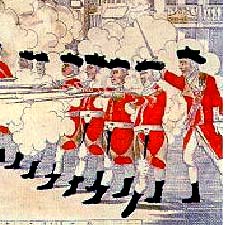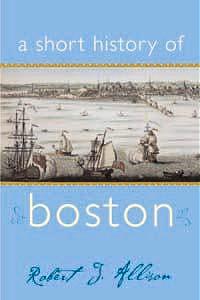| A Short History of Boston |

BOOK OF THE WEEK
After founding the Piscataqua in 1623, David Thompson packed up and went to Boston.
The two ports have been tied through history ever since. Here’s a quick and readable
guide to the 400 year history of our big cultural concrete neighbor to the South.
This one should sell like hotcakes. Robert Allison’s Short History of Boston is precisely the quick study I was looking for. We New Hampshire people are forever measuring our quality of life against Bostonians. Our "local" TV news is largely generated there. We fly in and out of Logan. We measure our museums and galleries and restaurants and theater against Boston culture.
 When it comes to history, Portsmouth has always done the same. Our stories are
very similar in places. We abused the native tribes, used up our natural resources,
traded and then fought with the Brits. The Revolutionary Era, in which Boston
steps into the limelight of American history, is a lot of us taking the lead from
the big city. They burned their stamp collector in effigy. We did the same. They
dumped tea in the harbor, we burned our tea shipments. Paul Revere came here.
Paul Revere went there.
When it comes to history, Portsmouth has always done the same. Our stories are
very similar in places. We abused the native tribes, used up our natural resources,
traded and then fought with the Brits. The Revolutionary Era, in which Boston
steps into the limelight of American history, is a lot of us taking the lead from
the big city. They burned their stamp collector in effigy. We did the same. They
dumped tea in the harbor, we burned our tea shipments. Paul Revere came here.
Paul Revere went there.
But somewhere between the Revolution and the Big Dig, I get lost. Boston, which starts with 1,000 colonists under John Winthrop, to our few dozen at Strawbery Banke quickly gets too damn big to follow. The Puritan ethic becomes a choking disease from which we have yet to recover. The merchants take over. The politics get ugly. The city, caked in tar and steel and concrete is unrecognizable and, for some of us, a nice place to visit, but no place to live.
Now we in the Seacoast have the train back, and I’ve been thinking how I should reconnect with the formerly shining city on a hill. We really are linked, irrevocably, to Boston, if only by the Red Sox and the Boston Globe and WBUR. We are jealous of her dominant role in history and thrilled to pieces that Boston, not Portsmouth, became the sprawling metropolis it did.
So where to begin the healing? Allison’s book is a good place to start. It is just the right size, scarcely 100 pages plus a detailed chronology and index. That makes it the perfect Cliff Notes for visitors, history buffs and students. It should be required reading in Beantown schools. Allison offers a readable revisionist history, inset with a ton of short biographies, right up to the Democratic National Convention in 2004. The corruption and pollution are there, along with the literary giants, the architects and engineers, the dreamers and the merely greedy. Women, immigrant and minority histories are smoothly integrated. Despite its size, the paperback is crammed with illustrations.
A Short History of Boston is a big story expertly compacted and fully updated for the post Big-Dig audience. It makes the massive city, for this rural New Hampshire reader at least, almost understandable and darn near lovable. – JDR
BUYT THE BOOK NOW from Amazon.com
A Short History of Boston
Robert Allison
Commonwealth Editions
128 pages, paperback
6" X 9"
$14.95
From the Publisher:
Boston has a topographical history and an encyclopedia. There are histories of
the Boston Red Sox, the Boston Symphony, and other great institutions in the city.
But there is no good short history of the city itself, not in print anyway, not
until now. With economy and style, Dr. Robert Allison brings Boston history alive,
from the Puritan theocracy of the seventeenth century to the Big Dig of the twenty-first.
His book includes a wealth of illustrations, a lengthy chronology of the key events
in four centuries of Boston history, and twenty short profiles of exceptional
Bostonians, from founder John Winthrop to heavyweight champion John L. Sullivan,
from "heretic" Anne Hutchinson to Russian-American author Mary Antin. In his course
on Boston history at Suffolk University, Allison leads students on walking tours
of the city. A Short History of Boston is a tour through history with an engaging,
knowledgeable guide.
